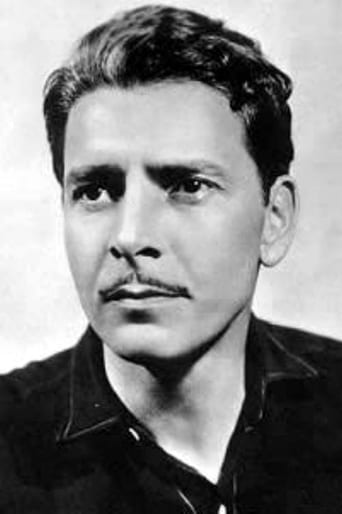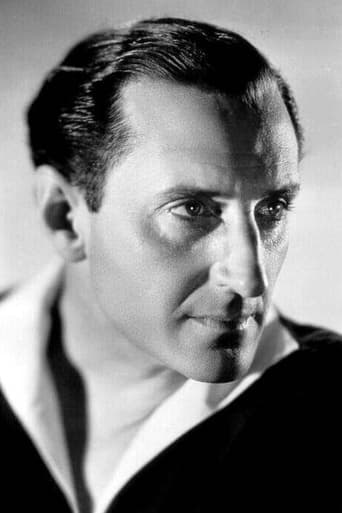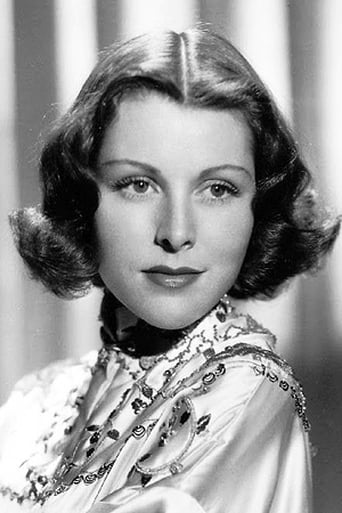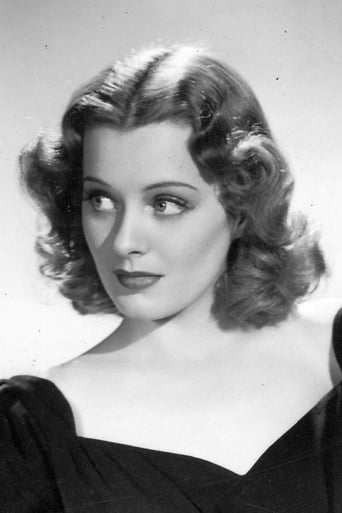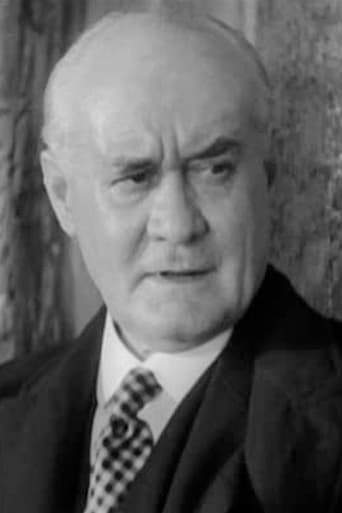Steineded
How sad is this?
MoPoshy
Absolutely brilliant
Glimmerubro
It is not deep, but it is fun to watch. It does have a bit more of an edge to it than other similar films.
Loui Blair
It's a feast for the eyes. But what really makes this dramedy work is the acting.
JohnHowardReid
Copyright 11 November 1938 by Paramount Pictures, Inc. New York opening at the Paramount: 28 September 1938. U.S. release: 11 November 1938. Australian release: 11 February 1939. Sydney opening at the Prince Edward: 11 February 1939 (ran 5½ weeks). 100 minutes.NOTES: Basil Rathbone was nominated for a prestigious Hollywood award for Best Supporting Actor, losing to Walter Brennan in Kentucky. Also nominated for Best Sets (Adventures of Robin Hood); Best Original Music Score (Adventures of Robin Hood); and Best Sound Recording (The Cowboy and the Lady). COMMENT: Usually the trouble with historical spectacles is that they tend to be lavish but dull. This one is lavish all right but, aside from some tediously obligatory romantic escapades between Colman and Dee - which somewhat pale by comparison with the earlier more vital ones with Ellen Drew - it has a fascinating, witty and literate script by Preston Sturges. The character of the king has been drawn with sharp, acerbic strokes, enabling Basil Rathbone a right royal time with his witty, eccentric dialogue. Here is one of Rathbone's few character roles in which he has successfully buried his usual mannerisms - and accent. He is almost unrecognizable both in speech and figure - yet the change in his usual stance and delivery is highly effective.Colman is his usual self, perhaps a trifle more animated than usual. Contributions from the large support cast, particularly Walter Kingsford, John Ridgely, Sidney Toler and Heather Thatcher are more than a match for the script.As usual, the director excels with the staging of crowd scenes and the execution of scenes of pageantry and action - the arrival of the Burgundian envoy at court, the attempted flight from the palace, the rout of the invaders. So far as its wit, its delight in eccentricity, the historical self-consciousness of its characters and amusing tables-are-turned situations, the script is modeled along Shavian lines. Alas, it is less than Shaw in its conventional romantic notion of its poet/thief hero, in its wearisomely prolonged trial in masquerade (a stale situation which is played as if it were both amusing and new), and especially in its routinely dull romance.Still, the film is elaborately dressed, the visuals have a splendid drive, thanks to Lloyd's deft pacing and astute camerawork. Photography, art direction, costumes, special effects, music, film editing, sound recording are marvelous.
edwagreen
Ronald Colman and Basil Rathbone both starred in the memorable "Tale of 2 Cities," an outstanding film dealing with revolutionary France. 3 years later they appeared in this 1938 production and with his sort of meek way of speaking, a memorable walk but the hidden viciousness of the usual sinister Rathbone, it garnered him a supporting Oscar nomination.This film does not compare with the 'Cities' class of 1935. The writing in this film is not as good and with treachery abounding here, we should have seen more of a devilish attitude by all concerned here.Even the priest is subdued here in a part that could have shown a lot more relevance.
theowinthrop
If English Medieval history is unevenly shown in Hollywood films (see my comment on YOUNG BESS), French Medieval history is non-existant. The sole real centers of films on France from 1000 to 1500 are those dealing with Joan of Arc and those dealing with that contemporary pair of Louis XI (the "Spider King") and Francois Villon, the great vagabond poet. In short, the period of roughly 1429-1431 (with a brief look into the future, via George Bernard Shaw, into the 1450s), and 1471 - 1477). The rest of the fifteenth century is ignored. As for preceeding eras, BECKET, THE LION IN WINTER, and THE CRUSADES all deal with the tangle of French and English politics in the years 1160 - 1199, and the two films of HENRY V do deal with the invasion of France in 1415, and the battle of Agincourt (but no films about Crecy or Poitiers). Louis XI was one of the most astute, crafty monarchs of France or any other nation in history. He is not a loveable figure (as his nickname of "Spider King" shows). But loveability was not a viable policy for any French monarch. England was a constant threat, even after the final defeat of the English in the Hundred Years War in the 1450s (long after Joan of Arc was burned). The monarchs would insist on keeping the Kingdom of France among their titles (after England, Ireland, Wales, and Scotland) into the 18th Century. There were dynastic marriages between the Burgundian royal house (modern day Belgium and Holland and the Rhineland make up what was Burgundy) and the British. Louis had to constantly balance friendly relations with realism about British aims (and Burgundian aims for that matter). Things came to a head in 1470 when Phillip of Burgundy, a wise leader, died and his son Charles the Bold (more accurately "the Rash") became Prince of Burgundy. Because of certain French lands near Paris owned by the Burgundians, Charles was a subject of Louis. But Louis's government was poorer than Charles's and he kept toying with either breaking his liege position with Louis or seizing the French throne. This latter policy led to a series of wars, including a siege of Paris. Remarkably, due to superior leadership qualities, Louis beat Charles - or rather Charles beat himself. In 1477 Charles died in a battle against another target - the Swiss republics. Louis died in 1483, the first really great modern French monarch or leader.He was suspicious, and ever ready to use torture. But given the general standards of his period (the same time as the Wars of the Roses, and of the likes of Cesare Borgia) his use of torture was actually consistant with his contemporaries. Louis popped up in other stories aside from IF I WERE KING - he was the king in THE HUNCHBACK OF NOTRE DAME (in the 1939 film played, more kindly, by Walter Hampden). In a silent version of IF I WERE KING, BELOVED ROGUE (with John Barrymore as Villon)Conrad Veidt played him as more crafty and dangerous - and superstitious. He would also show up as the monarch fighting Charles the Rash in the film of QUENTIN DURWARD (after the novel of Sir Walter Scott) that starred Robert Taylor. In the present film he is played by Basil Rathbone, for once not tied down to sleuthing or to using a sword against Tyrone Power or Errol Flynn. He is able to demonstrate the frustration of a wise monarch, hampered by traitors and by a lack of popular support. The screenplay by Preston Sturges gives him some good lines of humor as well (he was a capable comic actor - see his pompous dried-out composer in RHTHYM ON THE RIVER, or even his greedy relative in WE'RE NO ANGELS). The make-up on his face makes his eyes look constantly rhumey and nearly unrecognizeable.Villon is a great poet, of whom we know much but not enough. We don't know when he was born or when he died. We know he was a criminal (a thief and a murderer) but was able to avoid the scaffold - at least in known recorded history. In this film and BELOVED ROGUE he is forced to come to the aid of France, taking over the key job of High Constable (the previous High Constable, whom he killed, was a traitor to Louis). As this is a fiction, we are led to believe Villon manages within a week to instill spririt into the people of Paris, and to lead them to defeat the Burgundian army. Actually it was Louis who did that, with Charles's incomparably bad choices helping him. Still it makes a good story, and an enjoyable historical fantasy. The only thing missing is the Rudolph Friml score from Friml's operetta version, THE VAGABOND KING which did not appear until 1954 on screen. But even without that music it was enjoyable.
Arthur Hausner
I knew I was in for a treat when I saw Preston Sturges was scriptwriter for this film, which was clever and energetic, but I didn't expect such wonderful performances from both Basil Rathbone (who received an Oscar nomination) and Ronald Colman. I always felt Colman didn't pick up his lines fast enough (at least in his later years), but he's perfect playing the poet François Villon. Colman sounds like a poet whenever he speaks in all his roles! You've never seen Rathbone in any role quite like that of Louis XI. He sounds at first almost childlike, but it is a mask - he's pretty wily and knows what he is doing all the time. The script, of course, is pure hokum. You can't imagine for one moment that a king would make Grand Constable a man who was caught stealing food from the royal storehouse. As Grand Constable, he runs France! The extended scene where he, while hidden, metes out sentences to his friends who were also caught stealing, is pure delight, and very worthy of Sturges. I found fault with Villon's earlier escape, as it was too easy, and with the casting of Ellen Drew in the role of one of the wenches at the Fir Cone tavern, and who loves Villon. There was too much to enjoy in the film so those were easy to forgive. His other love is Frances Dee, playing one of the nobles at court, and she is always stunningly dressed in Edith Head's costumes. The rest of the cast was all first rate, and the Oscar-nominated sets were excellent. Curiously, the film is set in 1463, the approximate year that Villon died at the age of 32. Also, William Farnum, who plays General Barbezier in this film, played Villon in the 1920 silent of the same name as this film.
